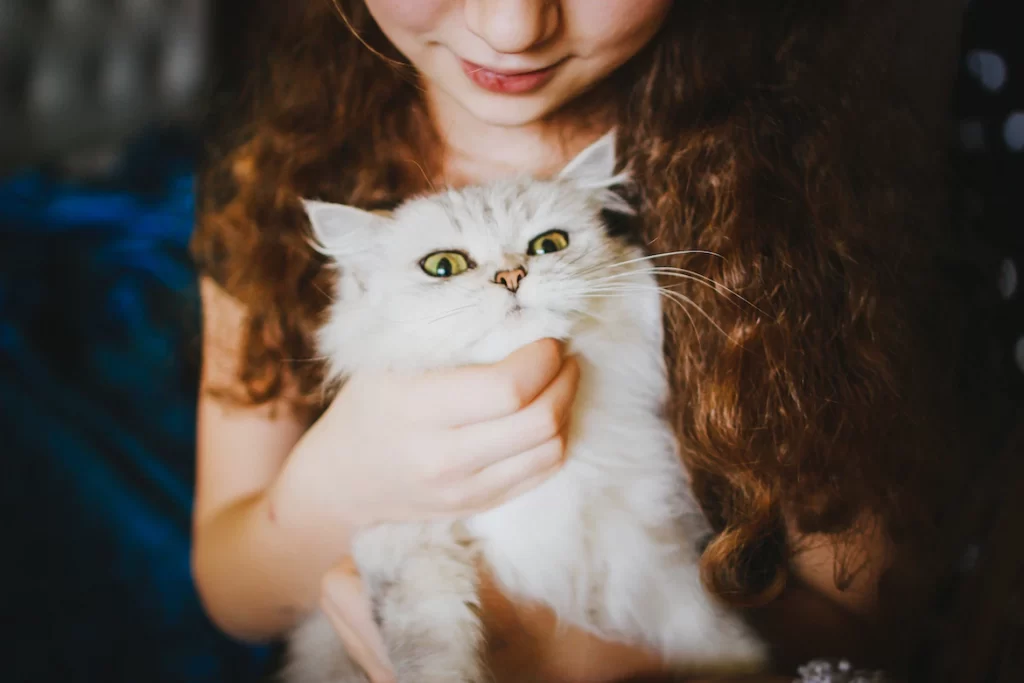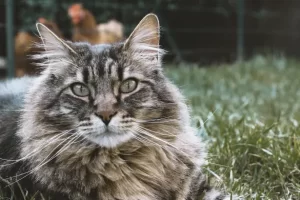Last updated on February 13th, 2023 at 03:02 am

Why do some cats not like to be held? Some cats adore showing their owners an abundance of attention and can’t get enough time cuddling. Other cats appear to place high importance on their own space and seem content to tolerate the presence of people merely.
Some of the most common reasons are your cat has trust issues, your cat is not used to human around (lack of sociability) or your cat might be injured. There are a few more reasons that we will explain in later part so stay tuned!
When you pick up certain cats, they will purr contentedly in your arms, while others may tense up and wriggle violently. There could be several factors contributing to the fact that your cat dislikes being held.
Why does it seem like my cat does not enjoy being picked up or cuddled?
A cat’s natural inclination is to conceal itself and avoid making contact with people. This could be because cats were initially brought indoors to be kept as prey animals and may continue to perceive people as dangerous.
It’s possible that some cats don’t like being petted because they don’t like being confined or coddled since it makes them feel uncomfortable. It’s also possible that some cats are timid or uneasy around people, and they might not like being held or caressed. The following are possible reasons they may not want to be touched or snuggled by anyone.
#1. Lack of sociability when the cat was younger
Lack of exposure to other people and animals is the most common cause of a cat’s dislike of being held. The amount of time available for getting a young cat used to be held is very limited. Between 2 and 7 weeks is the best time to begin socializing a new kitten.
Generally speaking, adult cats that had a pleasant experience as kittens being held and snuggled during this window are the cats that continue to appreciate being handled when they are full-grown. Older kittens can still be socialized when they are older and will be sociable and friendly with humans. However, they may continue to resent being held even after they have been socialized.
One study that investigated how well domestic cats tolerated being carried by an unfamiliar person found that the more exposure to human interaction a cat had when it was a kitten, the lower the probability that the cat would attempt to run away while it was being carried.
#2. It seems that your cat has some trust issues
Trust is necessary to feel at ease when being held by another human. Cats that do not have complete faith in you will be less inclined to be held than those who do. Some cats, particularly older cats or cats with a history of abuse or trauma, may view being carried as a confining and perhaps dangerous experience.
#3. Your cat has a lot going on
When attempting to hold your cat, it is essential to analyze its body language to determine how they feel about being held. It’d be that your cat is just not in the mood to be held right now. They may be in the middle of playing or wish to go somewhere peaceful to nap.
If you pick up your cat and see that its body is rigid or that they are writhing and struggling to escape your grasp, you should put them back down gently for the time being. Your cat’s tail twitching indicates that it is uncomfortable being held and wants to be released from your grasp. Your feline friend may even snarl or hiss to let you know how painful they are to be carried. If a cat is happy just to be held, its entire body will be relaxed.
#4. Your cat appears to be frightened
As people who own dogs, we want to consider ourselves to be the protectors of our cute little furry companions. However, it is not in your cat’s nature to run into your arms when it feels threatened. A scared cat wants nothing more than to get away and find a quiet and dark location to hide in.
#5. Your cat is ill or injured
If your cat suddenly becomes uncomfortable when being held, it may have an illness or have been hurt. When confronted with danger, a cat’s first inclination is to take cover. Because cats tend to hide their pain, it is not always easy to tell whether or not a cat is ill or injured.
Suppose your cat suddenly seems uncomfortable when being carried or caressed. In that case, you should take them to the veterinarian to determine whether or not they require medical assistance.
#6. Your cat just doesn’t like being held
Different cats have unique personalities and preferences when displaying their love for one another. While some cats are content to be in your immediate vicinity, others will make it their mission to occupy your lap at all times. Even after receiving the appropriate socialization, particular cats will never love being carried in human hands.
You must come to terms with how your cat intends to convey its emotions to you. Learn to read your cat’s body language so you can figure out when and how they want to be friendly. Do not try to hold your cat if they do not like to be held or if it is not in its nature. If you do this, you will only end up with a cat that is wary of you and keeps its distance from you.
How can I teach my cat to enjoy being picked up and cuddled?
Every cat is unique, and their reactions to being held will vary from one another. While some cats enjoy being carried and may even purr or knead in anticipation, others may be much more reserved and may not even accept being held. It all depends on the individual cat.
Holding the cat in a tight embrace, sitting down with the cat on your lap, or holding the cat on a warm, soft surface such as a bed, blanket, or pillow are some common strategies that are effective with some cats. It is essential to conduct experiments to determine the most successful methods with the particular feline in question.
What are some effective strategies for dealing with a cat that resists being held?
There are a variety of approaches one can use to coax a cat into tolerating being held when the feline in question expresses resistance to doing so. One solution is to experiment with various methods, such as praising the cat while having it or gradually acclimating the cat to being handled over time. Both of these approaches are viable options.
You can also try holding the cat in a particular position, such as holding it in the crook of your elbow or holding it in your hand with the palm facing up. Both of these options are viable alternatives.
Why does my cat follow me around everywhere I go, but refuses to cuddle up with me?
Suppose a cat is experiencing feelings of insecurity or threat. In that case, it may choose not to cuddle with its owner because of these emotions. When a cat perceives it is in danger or under attack, it may avoid physical contact to keep itself safe.
Alternately, a cat could not want to snuggle with someone because it is uncertain whether that particular human is friendly. Suppose the other person is not particularly warm and welcoming. In that case, the cat may fear that it may be harmed or punished if it snuggles up with that individual.
Is it possible to teach a cat to be affectionate?
The temperament and mannerisms of each cat will dictate the specific training techniques that must be utilized to coax a cuddly nature out of the pet. The use of positive reinforcement, the use of positive reinforcement to discourage unwanted actions, and the establishment of norms and guidelines for conduct are, however, some general recommendations that may be effective in training a cat to be cuddly.
Do older cats develop a warmer disposition toward their owners?
It is likely reliant on a wide variety of circumstances, such as the cat’s temperament, the environment in which they live, and the specific cat. As they age, some cats may grow more affectionate. In contrast, others may maintain the same devotion they had when they were younger.
A cat’s food, whether they are kept indoors or outdoors, and whether or not they have been mistreated in the past are some elements that may contribute to their personality and how they interact with their environment. Another aspect is whether or not they have been spayed or neutered.
How can I tell if my cat despises me or not?
There is no one correct response to this question because the answer is contingent on the individual cat and on the relationship between the cat and its owner. However, avoiding touch with the human, marking its territory aggressively, or being very loud about its discontent are all symptoms that a cat may dislike its human companion.
If a cat exhibits these behaviors regularly, it may be time to investigate whether the cat’s surroundings or treatment needs to be altered.
What should I do if I want my cat to snuggle up with me?
You might use a few distinct approaches to win your cat’s company as you cuddle. One method is to make an effort to seat them alongside you at the table. Another option is to see if you can convince them to lie down alongside you. You can also try to get them to purr or brush against you to show their affection.
How can I make my cat accept petting from me?
There are a few different ways that you can take to coax your cat into accepting petting from you. One strategy you could attempt is to get your cat to associate being petted with an activity or object that she appreciates.
To increase the likelihood that your cat will allow you to pet her, you should work to ensure that the encounter is pleasant for her. If your cat enjoys a game of fetch, for instance, you should try caressing her after she has successfully caught the ball. Another scenario could be that your cat wants to be caressed on the back, so you could try touching her from behind.
Conclusion
There are a few potential causes for why cats dislike being picked up and held. To begin with, they are naturally creatures of their own free will and may have a low tolerance for being constrained.
Additionally, some cats detest the feeling of being lifted off the ground at any time. If you try to hold your cat and it feels unpleasant, it is probably best to just let them go rather than continue to hold them.


